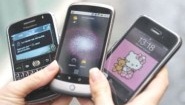Britain Addicted To Smartphones

Smartphones have sunk their claws deep into the British population according to Ofcom
Smartphone addiction has gripped more than a third of British adults and nearly two thirds of teenagers, according to a new Ofcom survey.
When asked about their smartphone use, 37 percent of adults and 60 percent of teens admitted they are ‘highly addicted’.
 Ofcom’s latest Communications Market Report also said a quarter of UK mobile users access the internet from their phone and almost six in ten of those get their fix from social networking sites.
Ofcom’s latest Communications Market Report also said a quarter of UK mobile users access the internet from their phone and almost six in ten of those get their fix from social networking sites.
Email is the second most popular activity with 53 percent sending and receiving email from their mobile.
Twenty seven percent of British adults and 47 percent of teenagers now own a smartphone. 59 percent of users had acquired theirs over the past year.
Work/life distinction smashed
According to Ofcom, smartphones are blurring the line between work and personal life.
Thirty percent of users say they regularly conduct personal calls during working hours, compared with 23 percent of regular mobile phone users. But, sadly, smartphone users are more likely to take part in work calls while on holiday or annual leave.
Seventy per cent admit to ever having done this with a quarter doing so regularly.
Ofcom’s Director of Research, James Thickett, said: “Ofcom’s 2011 Communications Market Report shows the influence that communications technology now has on our daily lives, and on the way we behave and communicate with each other.
“Our research into the use of smartphones, in particular, reveals how quickly people become reliant on new technology, to the point of feeling ‘addicted’.”
Teenagers are more likely to pay for apps while adults tend to take advantage of free ones. But only 47 percent of smartphone owning adults had ever downloaded an app.
Of paid for apps, games and music attract the most buyers from both groups.
More than you needed to know
Perhaps providing way too much information, the survey also reveals that 22 percent of adults and nearly 47 percent of teenage smartphone users admitted using or answering their handset in the bathroom or toilet (headine in the Sun: “I’m on the throne”).
But unsurprisingly teenagers are also more likely to use their smartphone in places they’ve been asked not to.
A recent report by Kantar Worldpanel ComTech said that the UK would reach the tipping point at which at least half of all the UK’s mobile phones would be smartphones by June next year.
Worldwide, feature phones are still the most popular handsets, thanks mainly to developing and emerging markets where mobile internet is more costly and less common.
On the back of this, and for those markets, more and more manufacturers are producing low cost smartphone models costing £100 and under.